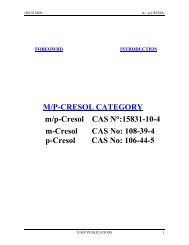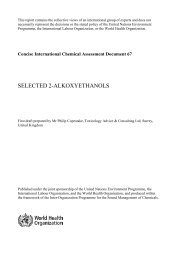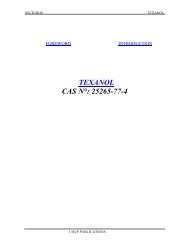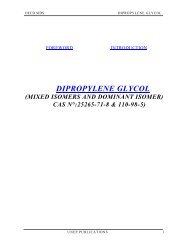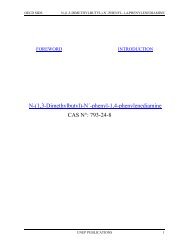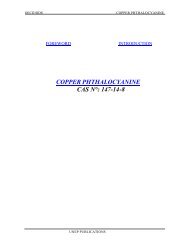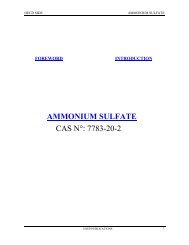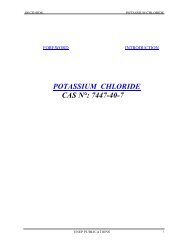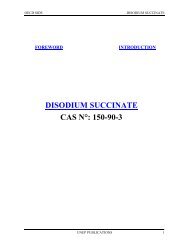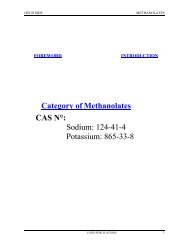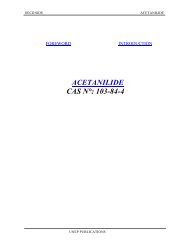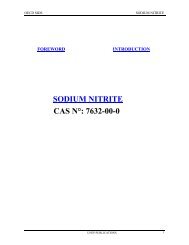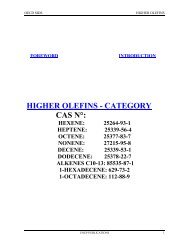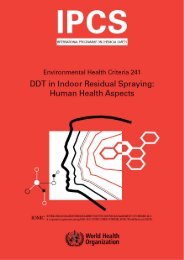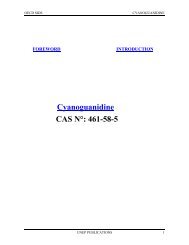evaluation of certain food additives - libdoc.who.int - World Health ...
evaluation of certain food additives - libdoc.who.int - World Health ...
evaluation of certain food additives - libdoc.who.int - World Health ...
You also want an ePaper? Increase the reach of your titles
YUMPU automatically turns print PDFs into web optimized ePapers that Google loves.
Finally, the forty-first session <strong>of</strong> CCFA agreed to a priority list <strong>of</strong> compounds<br />
for <strong>evaluation</strong>/re-<strong>evaluation</strong> by JECFA and also agreed to revise the text <strong>of</strong><br />
the Circular Letter on Priority List <strong>of</strong> Food Additives Proposed for Evaluation<br />
by JECFA to allow an indication <strong>of</strong> the names <strong>of</strong> the country either where the<br />
compound is legally traded or where it has been approved and to include more<br />
details on data to be submitted by JECFA.<br />
2.3 Principles governing the <strong>evaluation</strong> <strong>of</strong> compounds on the agenda<br />
In making recommendations on the safety <strong>of</strong> <strong>food</strong> <strong>additives</strong>, the Committee<br />
took <strong>int</strong>o consideration the principles established and contained in Environmental<br />
<strong>Health</strong> Criteria, No. 70 (EHC 70), Principles for the safety assessment<br />
<strong>of</strong> <strong>food</strong> <strong>additives</strong> and contaminants in <strong>food</strong> (Annex 1, reference 76), as well<br />
as the principles elaborated subsequently at a number <strong>of</strong> its meetings (Annex<br />
1, references 77, 83, 88, 94, 107, 116, 122, 131, 137, 143, 149, 152, 154,<br />
160, 166, 173, 176, 178, 184, 187 and 190), including the present one. EHC<br />
70 contains the most important observations, comments and recommendations<br />
made, up to the time <strong>of</strong> its publication, by the Committee and associated<br />
bodies in their reports on the safety assessment <strong>of</strong> <strong>food</strong> <strong>additives</strong>.<br />
2.3.1 Codex GSFA-related questions<br />
The Committee received two questions from the United States <strong>of</strong> America<br />
(USA), which arose when the USA was preparing a paper on the Codex GSFA<br />
for the next session <strong>of</strong> CCFA.<br />
Sodium and potassium sulfates<br />
The Committee was asked whether the ADI for sodium sulfate also applied<br />
to sodium hydrogen sulfate and whether the ADI for potassium sulfate also<br />
covered potassium hydrogen sulfate. The Committee had previously evaluated<br />
sodium and potassium sulfate; the sulfate ion was allocated an ADI “not<br />
specified” at the twenty-n<strong>int</strong>h meeting (Annex 1, reference 70). In evaluating<br />
sodium hydrogen sulfate at the present meeting, the Committee considered<br />
that the principles elaborated at the twenty-n<strong>int</strong>h meeting for fully ionizable<br />
salts were applicable. It further considered that this approach could also be<br />
used in evaluating other fully ionizable sulfates, including <strong>food</strong>-grade potassium<br />
sulfate and potassium hydrogen sulfate. In conclusion, the ADI “not<br />
specified” for potassium sulfate is also applicable to potassium hydrogen<br />
sulfate.<br />
Nisin and nisin preparation<br />
In response to the question as to whether the ADI refers to nisin or nisin<br />
preparation, the Committee noted that when the name had been changed from<br />
5



